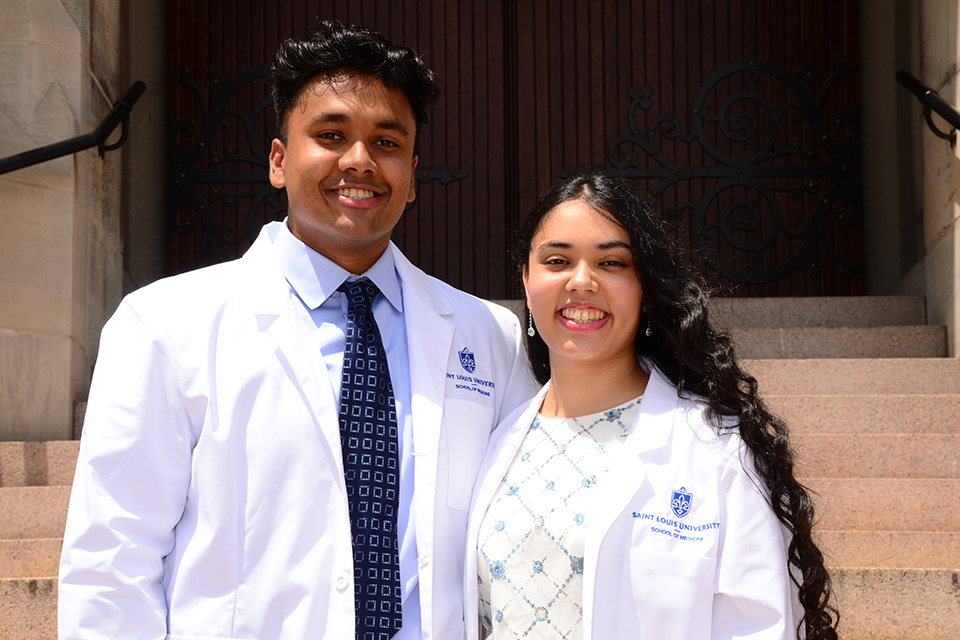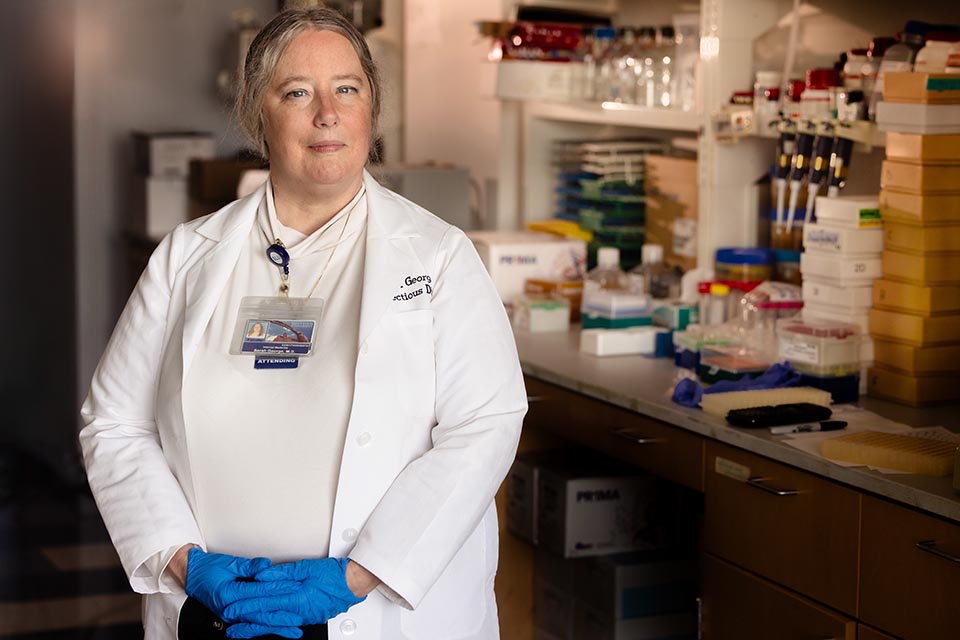In Their Parents Footsteps: Siblings Enter Saint Louis University School of Medicine Together
07/31/2024
ST. LOUIS – Attendees were seeing double at this year’s Saint Louis University School of Medicine White Coat Ceremony.
Aarti and Arjun Sahai, siblings in a triplet set, have shared essential milestones over the years. On Sunday, July 28, they added one more to their repertoire. They were part of the incoming Class of first-year medical students at SLU.

From left, Arjun and Aarti Sahai, siblings in a triplet set, are incoming first-year medical students at Saint Louis University School of Medicine. Photo by Kyle Kabance.
Unlike their brother, Akshut, who’s studying to become a dentist at Arizona State University, Aarti and Arjun chose to enter the medical profession like their parents, Animesh, M.D., and Madhu, M.D., who cloaked their children in their first white coats at the ceremony.
Aarti and Arjun are among 26% of incoming medical students who are SLU alums, earning undergraduate degrees in public health and neuroscience, respectively. They were also among 15% of the class who came from SLU’s Medical Scholars Program.
Training to Address Health Disparities
Natives of Kentucky, Aarti and Arjun lived in Washington state before moving with their parents to Sikeston, Missouri, at the start of their sophomore year in high school. Growing up in a rural community in the Bootheel, Aarti and Arjun noticed it was a hotspot for underserved populations.
Rural Missourians often face more disparities in health outcomes than their urban and suburban counterparts, in part from challenges accessing health care. Aarti said it’s jarring to witness “critical components” of urban and rural communities going without the care they need. Still, Aarti said she’s being trained to address health disparities.
Aarti credits the program with an early introduction to the biopsychosocial approach to medicine that systematically considers biological, psychological, and social factors and their complex interactions in understanding health, illness, and health care delivery.
The siblings say they gravitated to SLU because of its reputation as a top-ranked research university where faculty and students conduct ground-breaking work to address the world's toughest challenges. Aarti and Arjun are already impacting their community in positive ways.
Through an ongoing research internship with the City of St. Louis Department of Health, Aarti is playing a pivotal role in the fight to end the HIV epidemic. She created HIVE: The Art of Coming Together, a multi-pronged, community-based intervention program that tackles HIV health education at the individual, institutional, and community levels to increase the uptake of HIV prevention resources in underserved, marginalized groups ages 13-24 in the city of St. Louis.
As an ASPIRE Research Fellow through Washington University School of Medicine, Arjun assisted in a clinical trial that investigated the safety and efficacy of a diabetic medication in a sample of epileptic adults. He was also paired with a pediatric neurologist to assist with research on the health outcomes of parents of children with epilepsy who were found to have higher rates of stress, anxiety, and depression and exceeded the threshold for behavioral health referrals. He and his mentor presented their findings at last year’s Child Neurological Society annual meeting.
Looking ahead to their plans after medical school and residency, the duo said they’re keeping their options open. But one thing for sure is they will remain committed to service, Aarti said.
Arjun agreed, “I was drawn to SLU’s commitment to community-driven initiatives, which is a big part of SLU’s mission. I want to learn how I can play a role in this.”
White Coat Ceremony 2024
Latest Newslink
- A Camp Friendship that Stirred Up Lifelong BondsIn the summer of 2005, Mary Kate Keenoy (Chaifetz Grad '22) and Genevieve Willman met at SLU's Gardens to Tables culinary camp. What started as a shared interest in cooking grew into a lasting friendship that has endured for two decades.
- Bruce Bacon, M.D.: 1949-2025Bruce Bacon, M.D., professor emeritus of internal medicine, died Sunday, July 6, 2025. He was 75. Bacon was known globally for his expertise in all aspects of clinical hepatology, specifically hemochromatosis, viral hepatitis, chronic liver disease / general hepatology, and liver transplant. Bacon was also a member of the research team that discovered the gene for hemochromatosis, HFE, in 1996.
- SLU Launches William L. Clay, Sr. Institute of Civic Engagement and Economic JusticeThe Clay Institute will provide immersive learning experiences and hands-on training that address the social and economic challenges facing the St. Louis region and the nation. Institute programming will be available to all students with an interest in civic engagement and democratic participation.
- SLU Research Explores Depression's Ripple Effect on DiabetesA study conducted by researchers at Saint Louis University found that patients with depression were more likely to have uncontrolled diabetes over time and that depression contributes to a heightened economic burden to diabetes management.
- SLU/YouGov Poll: Statewide Cell Phone Ban for Missouri Schools Popular with VotersGovernor Mike Kehoe has signed Senate Bill 68 into law, enacting a statewide ban on the use of personal electronic devices, including cell phones, tablets, and smartwatches, throughout the school day in Missouri public and public charter schools.
- SLU Vaccine Center Will Enroll Healthy Volunteers in Yellow Fever Vaccine Clinical TrialSaint Louis University's Center for Vaccine Development will enroll up to 70 adult volunteers in a clinical trial to study the safety elicited by a new investigational vaccine for yellow fever, a potentially deadly disease that is spread by mosquitoes. The research is funded by Sanofi Pasteur.













